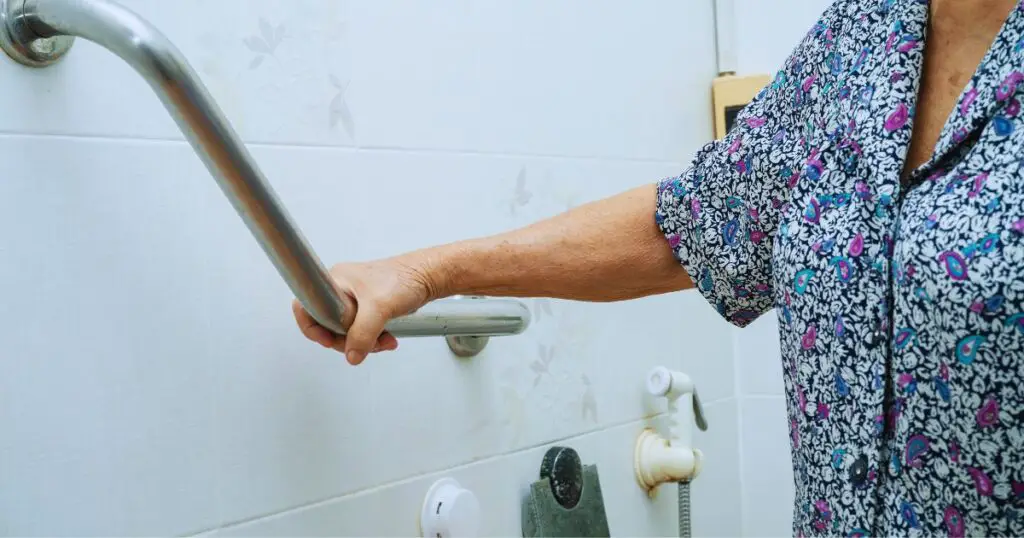As an Amazon affiliate, I may earn from qualifying purchases. Please read our Disclaimer and Privacy Policy.
How often should the elderly shower for their health? If you’re the caretaker, you may be asking yourself this question for good reason.
According to Helping Hands Homecare, once or twice a week should be enough to prevent skin conditions and infection.
It can be challenging to ensure your loved one is safely showered or bathed. A lot can go wrong without proper safety precautions.
In addition, you may be suffering from your own ailments that makes it much more difficult to do.
The fact is, maintaining personal hygiene is vital for elderly individuals. However, daily bathing may not always be necessary or practical.
For some, especially those experiencing cognitive changes or memory loss, a couple of times a week might be the best way to manage cleanliness without causing too much stress.
In this post, I’ll go over certain factors to consider when deciding how often you should bath the senior.
Discover safe bathing products that can help prevent accidents, and learn when it might be time to call in a professional home care worker for help.
Disclaimer:
Disclaimer: The information provided in this blog post is for general informational purposes only and is not intended as medical advice.
The showering needs and routines of elderly individuals can vary greatly depending on personal health, skin conditions, mobility issues, and other individual factors.
Always consult with a healthcare provider or a professional caregiver before making any changes to the hygiene routines of elderly persons.
The author and publisher of this blog are not responsible for any adverse effects or consequences resulting from the use of the information provided in this article.
Common Problems You Might Face When Showering the Elderly
Bathing older adults can present several common problems for family members or friends.
When my mother was in her last days and very weak from cancer, I tried to get her into the tub. Unfortunately, I just couldn’t do it.
Frankly, I lacked the confidence and skills needed to do it safely.
I also worried I might hurt her, which made the process that much worse. It was about that time when I realized it was time to bring in some help.
It’s not that she had limited mobility. The fact was that she was weak from cancer and barely had the energy to stand.
It definitely made getting in and out of the bathtub challenging.
She lived in an old house and didn’t have a walk-in shower either.
Getting her into the tub definitely increased the likelihood of slips or falls.
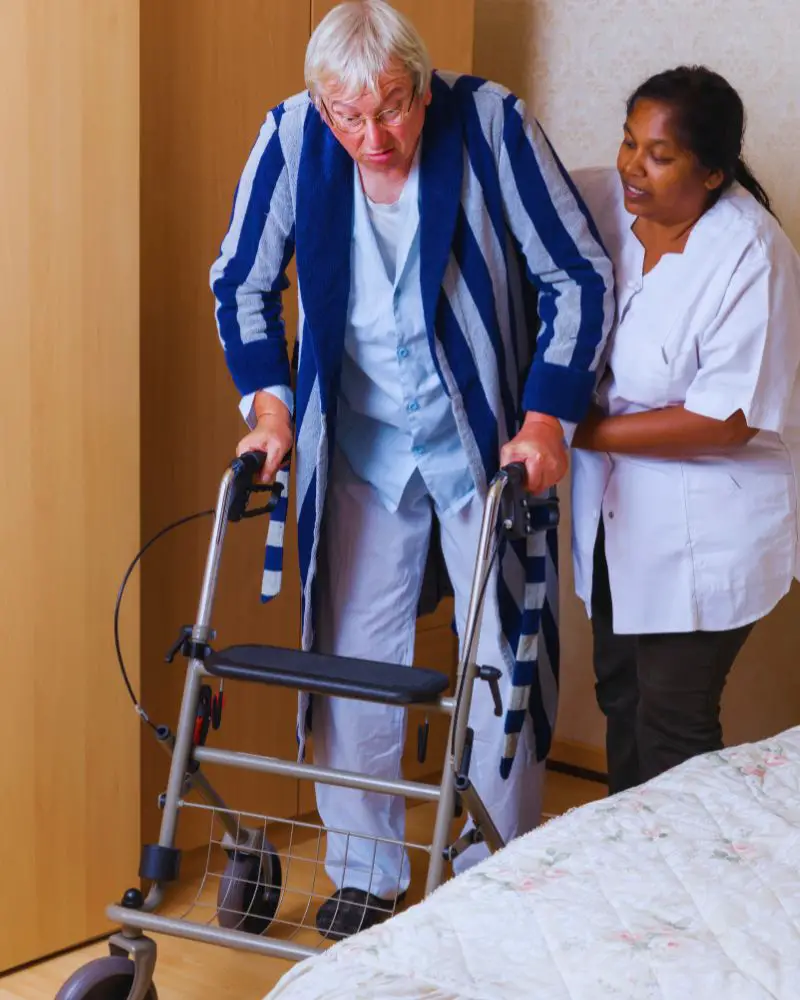
Assistive Shower Tools That Can Make Showing the Elderly Easier
Assisting an elderly person with bathing can be made easier and safer with various assistive tools. The following are a few ideas to help get you started.
If you need funding for accessibility equipment, check with Silver Cross for information.
Sponge Bath
For those who find it difficult to take a full bath or shower, a sponge bath can be an effective alternative. The benefit of this is that it can be done anywhere.
Elderly people who don’t have the energy to move or the mobility to move safely, can be effectively cleaned wherever they are.
You’ll need:
- A basin of warm water
- Mild soap or body wash
- Washcloths and towels
- Disposable gloves for hygiene purposes, especially if there are open wounds or sores
- Moisturizing lotion
- Protective bed linens or towels
- Clean clothes or dressing gown
- Disposable under pads (optional)
- Comb or brush
When cleansing the skin, use mild, hypoallergenic, and fragrance-free products. This will help to minimize the risk of skin irritation.
Keep the water warm, not hot, and use a soft washcloth or sponge. Make sure to clean around the skin folds and hard to reach areas.
Gently pat the delicate skin dry to avoid friction.
Shower Chairs
Shower chairs provide a stable and comfortable seat, allowing elderly individuals to sit while bathing, reducing the risk of falls.
If the senior is able to manage some or all of the bathing routine, let them! That said, it’s important to remain nearby to be of any assistance.
Always allow for as much privacy as possible.
Grab Bars
Patients with limited mobility can have grab bars installed in the shower or bathtub offer additional support for balance.
In cases where a traditional bath isn’t feasible, baby wipes and waterless cleansers can be used. They’re more useful for a quick cleanup. Using them too often may cause skin irritation.
How do you know it’s time to call in a professional home-care worker?
There are a number of situations where bathing an elderly patient may be too much for one person to manage. This can happen for many reasons and is no fault of the caregiver.
Below are some of the most common reasons why people ask for additional help:
Limited Mobility
Caregivers may need to call in a professional for help when dealing with patients with limited mobility due to conditions such as arthritis, stroke, or severe osteoporosis.
In fact, the person with limited mobility may be you!
These patients often require specialized techniques and equipment for safe transfers in and out of the bathtub or shower.
Professional caregivers are trained to handle such situations, reducing the risk of injury to both the patient and the caregiver, and ensuring that the bathing process is safe and efficient.
Bathing or Showering Elderly Patients With Cognitive Impairments
Cognitive impairments caused by diseases like advanced dementia or Alzheimer’s can add another level of complexity to showering elderly people.
It really depend on the patient and who they trust and feel most comfortable with.
Elderly people with any form of dementia can experience confusion, anxiety, or resistance to bathing.
This is a challenging process for untrained family members.
According to the Alzheimer’s Association and the National Institute on Aging, dementia patients may become agitated and aggressive. Sometimes just the sensation or sound of running water can cause distress in these individuals.
Professionals are skilled in handling these behaviors with patience and understanding, employing techniques that minimize stress and ensure a safe, respectful bathing experience.
Helping Elderly Patients Shower with Skin Conditions
Showering an elderly person with skin conditions requires special care to avoid aggravating their skin.
Read: Skin Care Changes Dermatologists Recommend for information on how to care for aging skin. The article includes information on relieving dry skin at bath time and other great tips.
Navigating Medical Equipment
Patients who use medical devices such as catheters, IV lines, or feeding tubes present unique challenges during bathing.
Family caregivers may find it difficult to manage these devices without causing harm or discomfort.
Professional caregivers have the training to handle medical equipment safely, ensuring that these devices are not dislodged and that the patient remains comfortable and hygienic throughout the process.
If you’ve asked your loved ones medical team how often your elderly family member should be washed, they may have already instructed you on how to manage medical equipment.
If you’re not sure, always check with the medical team or doctor for advice.
This might be a good time to consider bringing in a home care nurse (home health nurse). These people are registered nurses that visit your home where they provide medical and personal care.
They can help tremendously by administering medication, monitoring and reporting the patient’s condition, and assisting with grooming and hygiene.
Managing The Elderly With Severe Frailty
Elderly individuals who are severely frail require very gentle handling during bathing to avoid bruising, exhaustion, broken bones, etc.
Professional caregivers can provide the necessary support and care to make the bathing process as gentle and stress-free as possible.
Dealing with Mental Health Issues In The Elderly
Caring for elderly patients with mental health issues such as severe anxiety, depression, or behavioral problems can make bathing particularly challenging.
The process of bathing or showering is an intimate experience that may be overwhelming or embarrassing to the individual who needs help.
Professional caregivers are trained to manage these conditions with sensitivity and compassion, providing a calming presence that can help alleviate stress and fear.
Talk to your loved one and find out if they prefer help from you or a trained professional.
Home health nurses ensure that the patient’s mental health needs are considered during care.
Dealing with Sensory Impairments
Sensory impairments in the elderly primarily include varying degrees of hearing and vision loss. They may experience dizziness or easily become unbalanced as well.
Read: Caretaker Strategies for Managing Sensory Changes in Seniors for more information.
How to Ensure Your Safety and the Safety of the Elderly Person
Ensuring the safety and ease of regular bathing for the elderly requires using various products and solutions tailored to their unique needs.
For those who struggle with a daily shower due to mobility or medical reasons, using warm washcloths or moist wipes can be a good idea for maintaining senior hygiene.
These alternatives help prevent skin infections and keep the immune system strong without the need for full immersion in water.
Best Assistive Devices For Showering the Elderly
The following products can be used to enhance safety when showering elderly people. The products shown below are designed for bathroom safety.
Read and follow product instructions carefully. Some products may require professional installation.
Shower Chairs and Benches
These provide stability and reduce the fear of falling, especially for dementia patients who may be particularly anxious.
Platinum Health Carousel
Sliding Shower Chair
Tub Transfer Bench with Swivel Seat
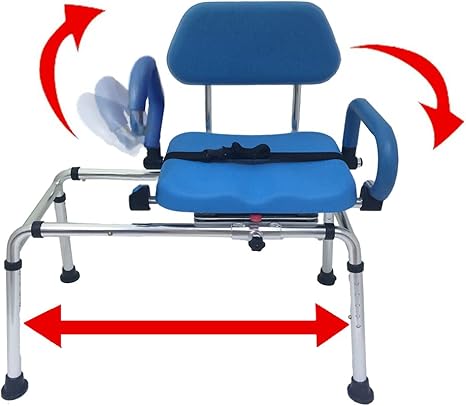
Grab Bars
Installed in and around the shower or bathtub, grab bars offer additional support and safety features.
Grab Bars for Bathtubs and Showers
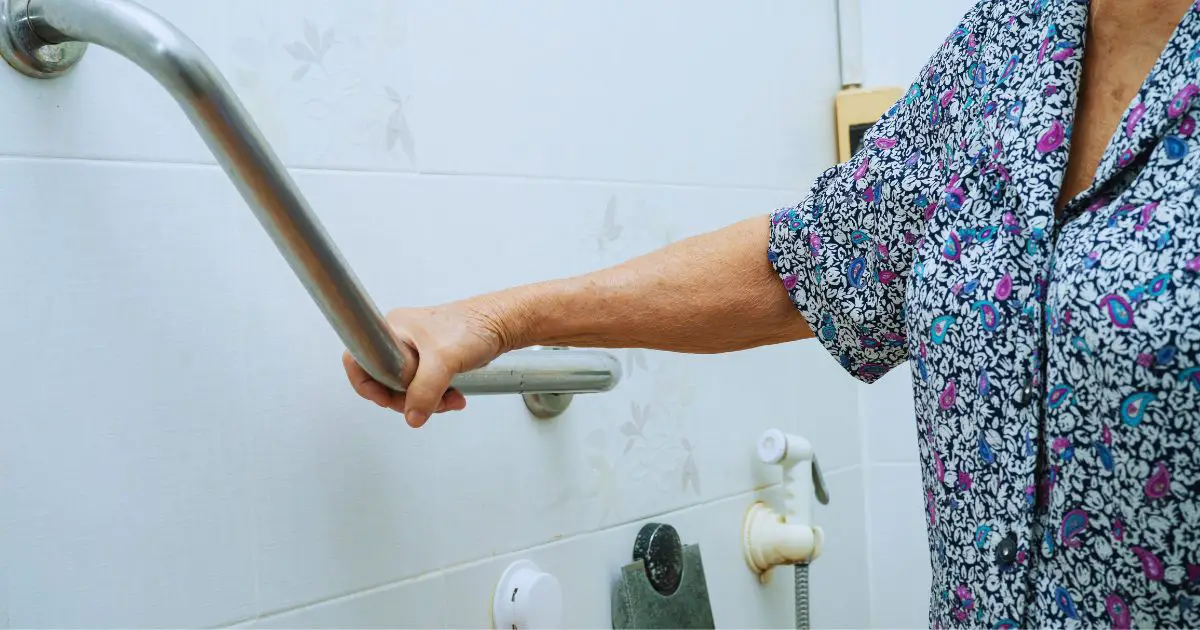
Handheld Shower Heads
These make it easier to rinse and clean without needing to stand or move excessively.
Moen Engage Magnetix Chrome 2.5 GPM
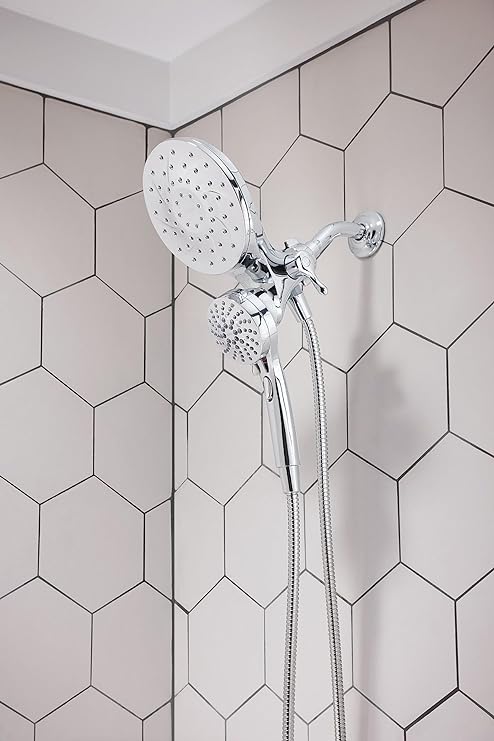
Handheld/Rain Shower 2-in-1 combo
- With removable handheld spray
- 2-in-1 combo featuring magnetic docking system
- 60 inch kink-free metal hose
Shower Step
A good, non-slip shower step can make getting in and out of the bathtub a little easier and safer. Having a grab bar near by can help make the process even safer.
Bath Shower Step
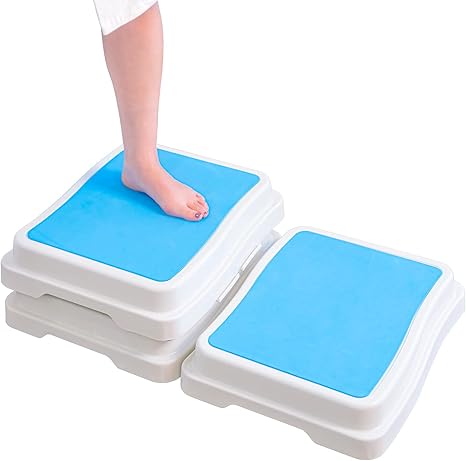
Stackable, Indoor/Outdoor
- For high beds, kitchens, and bathroom
- Non slip safety step stool
- Indoor/outdoor
Long-Handled Bath Sponge
In addition to some of the shower supplies mentioned earlier in this post, you should also have a long-handled bath brush or sponge.
This is especially useful for seniors who have a hard time reaching their backs. It’s also great for caregivers, allowing you a better range of motion without having to over extend your own body.
Back Scrubber Anti-Slip for Shower
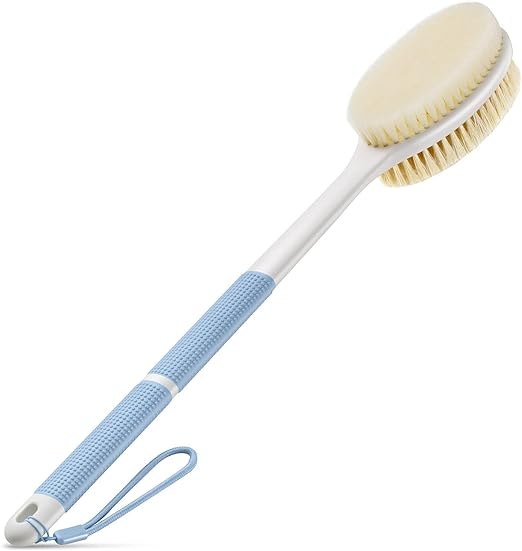
Long handle with stiff and soft bristles
- Hanging rope included
- Non Slip Handle
- Lightweight
- Affordable
Non-Slip Mats
Non-slip mats are perfect for the tub and shower. In order to make sure you get the most from your non-slip mats, make sure not to add any additional oils or creams to the bath.
These will make the bathtub or shower slippery, even with the mats.
Gorilla Grip Patented Bath Tub Shower Mat
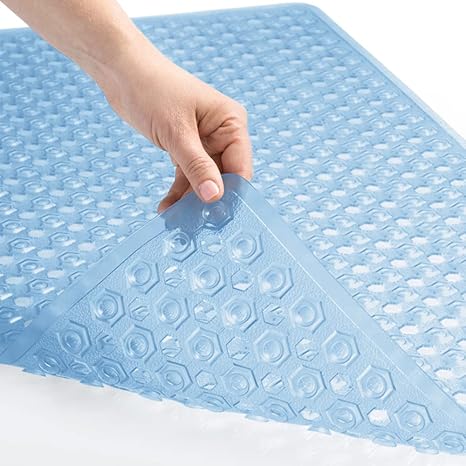
Size: 35 x 16 inches
- Washable with suction cups and drain holes
- Patented design to securely stay in place
- Easy water drainage
Portable Showers
Portable showers can be set up in different locations, offering flexibility and ease of use, particularly for those who cannot access a traditional bathroom setup.
Medical Inflatable Bathtub
Shower Bath Basin Kit
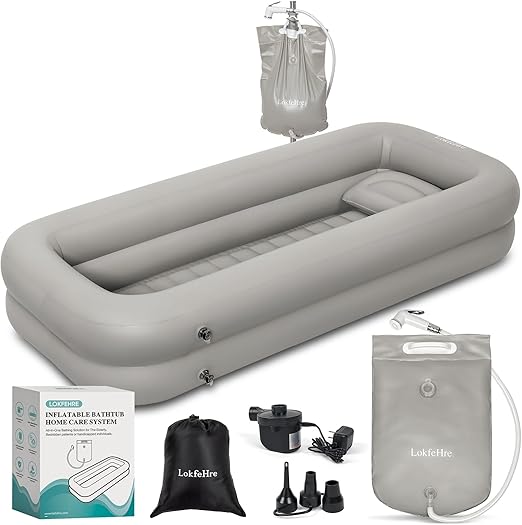
$119
- Kit includes 1 inflatable bathtub, 1 showerhead, 1 water bag, 1 electric pump, and 1 drain.
Conclusion
The solutions and products noted above can help caregivers better assist the elderly when bath time rolls around.
Incorporating assistive devices, alternative bathing methods, and appropriate skin care can address the unique needs of seniors, ensuring their hygiene and comfort while minimizing risks.
Always keep safety at top of mind when showering elderly people. Avoid adding moisturizing creams or oils to the bathwater because it increases the risk of falls.
And finally, don’t be afraid to ask for help.

